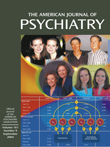Incidence of Newly Diagnosed Diabetes Attributable to Atypical Antipsychotic Medications
Abstract
OBJECTIVE: The purpose of the study was to determine the proportion of patients with schizophrenia with a stable regimen of antipsychotic monotherapy who developed diabetes or were hospitalized for ketoacidosis. METHOD: Patients with schizophrenia for whom a stable regimen of antipsychotic monotherapy was consistently prescribed during any 3-month period between June 1999 and September 2000 and who had no diabetes were followed through September 2001 by using administrative data from the Department of Veterans Affairs. Cox proportional hazards models were developed to identify the characteristics associated with newly diagnosed diabetes and ketoacidosis. RESULTS: Of the 56,849 patients identified, 4,132 (7.3%) developed diabetes and 88 (0.2%) were hospitalized for ketoacidosis. Diabetes risk was highest for clozapine (hazard ratio=1.57) and olanzapine (hazard ratio=1.15); the diabetes risks for quetiapine (hazard ratio=1.20) and risperidone (hazard ratio=1.01) were not significantly different from that for conventional antipsychotics. The attributable risks of diabetes mellitus associated with atypical antipsychotics were small, ranging from 0.05% (risperidone) to 2.03% (clozapine). CONCLUSIONS: Although clozapine and olanzapine have greater diabetes risk, the attributable risk of diabetes mellitus with atypical antipsychotics is small.



